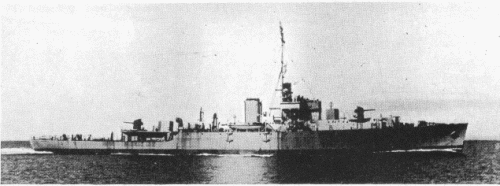
GASCOYNE frigates (1943-1946)

nearly sister-ship Jed 1944

Barcoo 1963
| Name | No | Yard No | Builder | Laid down | Launched | Comp | Fate |
| Barcoo | K375, 1950- F174, 1969- 174 | Cockatoo DYd | 10.1942 | 26.8.1943 | 1.1944 | BU 2.1972 | |
| Barwon | K406, 1950- F402 | Cockatoo DYd | 5.1943 | 3.8.1944 | 1.1946 | BU 8.1962 | |
| Burdekin | K376, 1950- F403 | Walkers, Maryborough | 1.1942 | 30.6.1943 | 6.1944 | BU 9.1961 | |
| Diamantina | K377, 1950- F377 | Walkers, Maryborough | 4.1943 | 6.4.1944 | 4.1945 | survey vessel 1959, preserved 2.1980 | |
| Gascoyne | K354, 1950- F354 | Morts Dock, Sydney | 7.1942 | 20.2.1943 | 11.1943 | survey vessel 1959, BU 2.1972 | |
| Hawkesbury | K363, 1950- F363, 1969- 363 | Morts Dock, Sydney | 8.1942 | 24.7.1943 | 7.1944 | BU 2.1972 | |
| Lachlan | K364, 1950- F364 | Morts Dock, Sydney | 3.1943 | 25.3.1944 | 2.1945 | to New Zealand 10.1949 (Lachlan) | |
| Macquarie (ex-Culgoa) | K532, 1950- F532, 1969- 532 | Morts Dock, Sydney | 12.1943 | 3.3.1945 | 12.1945 | BU 7.1972 |
|
Displacement standard, t |
1310 - 1460 |
|
Displacement full, t |
1920 - 2180 |
|
Length, m |
86.3 pp 91.8 oa |
|
Breadth, m |
11.2 |
|
Draught, m |
3.61 - 3.89 deep load |
|
No of shafts |
2 |
|
Machinery |
2 VTE, 2 Admiralty 3-drum boilers |
|
Power, h. p. |
5500 |
|
Max speed, kts |
20 |
|
Fuel, t |
oil 646 |
| Endurance, nm(kts) | |
|
Armament |
Burdekin: 2 x 1 - 102/40 QF Mk XIX, 2 x 2 - 20/70 Oerlikon Mk II/IV, (2 - 4) x 1 - 20/70 Oerlikon Mk II/IV, 1 x 24 - 178 Hedgehog ASWRL, 8 DCT, 2 DCR (150) Barcoo, Gascoyne, Hawkesbury: 2 x 1 - 102/45 QF Mk XVI, 2 x 2 - 20/70 Oerlikon Mk II/IV, (2 - 4) x 1 - 20/70 Oerlikon Mk II/IV, 1 x 24 - 178 Hedgehog ASWRL, 8 DCT, 2 DCR (150) Barwon, Diamantina, Lachlan: 2 x 1 - 102/45 QF Mk XVI, (1 - 3) õ 1 - 40/56 Bofors Mk III, 1 x 24 - 178 Hedgehog ASWRL, 8 DCT, 2 DCR (150) Macquarie: 1 x 2 - 102/45 QF Mk XVI HA, 2 x 3 - 305 Squid ASWRL, 8 DCT, 2 DCR (54) |
|
Electronic equipment |
type 271, A272 Mk II or SC-1 radars, type 144 sonar Macquarie: type 271, A272 Mk II or SC-1 radars, type 144, type 147 sonars |
|
Complement |
140 |
Project history: Design of "River" class frigate
was developed in 1941 when it became clear, that
for service in Atlantic escorts larger than "Flower" class
corvettes are required. Significantly increased dimensions have allowed to improve
seaworthiness and habitability, to place additional
armament and to fit twin-shaft machinery (actually doubled
machinery of "Flower" class corvettes) and to
increase speed to 20kts.
Originally known as "twin-screw corvettes", "River" class ships, as well as
their predecessors, created on standards of merchant shipbuilding, but their
hulls had outlines more habitual for a warship, and its slenderness has
increased from 6 to 8. Thus the building technology, as well as corvettes,
as much as possible adapted for usage on the yards which do not have experience
of construction of combat ships.
Frigates were built also by Australia with a little differing from standard armament, consisting of two
single 102mm. Later Australian ships had improved armament. Order for 10 units cancelled.
Modernizations: 1944, Burdekin: - 2 x 1 - 102/40; + 2 x 1 - 102/45 QF Mk XVI
1945, Barcoo, Hawkesbury: - 2 x 1 - 102/45, 2 x 2 - 20/70, (2 - 4) x 1 - 20/70, 1 x 24 - 178 Hedgehog ASWRL; + 1 x 2 - 102/45 QF Mk XVI, 1 x 1 - 40/56 Bofors Mk III, 2 x 3 - 305 Squid Mk 4 ASWRL, type 275 radar, type 147 sonar. DC stowage was decreased to 54.
Naval service: Diamantina was preserved in Brisbane.

Burdekin 1946
© Ivan Gogin, 2015